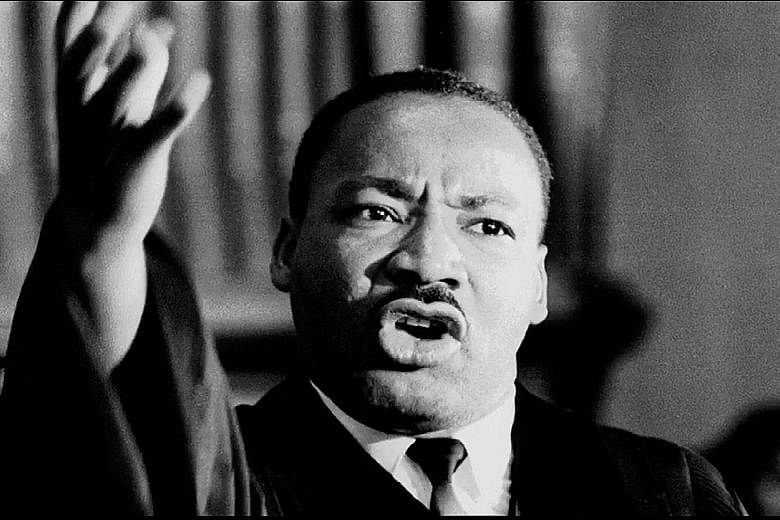NEW YORK • American civil rights leader Martin Luther King Jr had a dream of social justice for all, but his private life was turning out to be quite a nightmare before he died, a new documentary asserts.
King was assassinated in Memphis this week in 1968, 50 years ago, when he was 39.
It can be a tricky task to make a documentary of King that not only feels new, but also remembers him as a human, faults and all. However, King In The Wilderness, airing on HBO (not scheduled in Singapore) and zeroing in on the last few years of his life, offers empathetic and revealing insights.
It acquaints viewers with a leader privately mired in self-doubt, who is physically and mentally exhausted by his punishing schedule and challenged by the contradictory forces that threaten to undermine the progress already made.
"The most difficult time in his life was the 18 months before the assassination," said Mr Clarence Jones, King's lawyer.
Without any biographical sketching or preamble, the film deliberately skips ahead to a low moment in King's story - well after the 1963 March on Washington, where he delivered his "I have a dream" speech.
Almost symbolically, the archival footage seen here is no longer the crisp black-and-white film of King's zenith. Overnight, it seemed, a different kind of 1960s arrived, in a vivid yet imperfect rainbow of colour films made with herky-jerky handheld cameras.
African-American activism began to run counter to King's resolute message of non-violence, and it was all he could do, from 1966 to 1968, to stay the course he charted.
As others urged forceful tactics and riots became common in headlines, King was surprised to find himself being occasionally heckled by black audiences, such as when he travelled to Los Angeles after the 1965 Watts riots.
Through interviews with those who worked closely with him, the documentary shows a man accustomed to commanding respect and eliciting scorn with just about every move he made, including his decision to refocus the work of the Southern Christian Leadership Conference from the South to the North, to better concentrate on urban issues.
The persistence of poverty preoccupied King and provided a vision of the work ahead. He believed that without economic equality, or some hope of it, there could never be such a thing as racial or legal equality.
On that note, he delivered a stirring address at New York's Riverside Church in April 1967 that deplored the Vietnam War and economic injustice.
The socialist overtones set off more alarms for those already secretly spying on King's activities, including Federal Bureau of Investigation director J. Edgar Hoover, who amassed a damaging file on King that included alleged affairs and dubbed him "an immoral opportunist".
Months before his death, King was reportedly depressed but encouraged when others told him to "bring the poor to Washington" for a march.
He hoped that all races - black, Hispanic, white - would join to work against poverty.
At the same time, some of his colleagues urged him to take a sabbatical - he had been working non-stop for more than a decade.
Joining Memphis sanitation workers for a strike in March 1968, King was devastated when the protests turned violent before his eyes. But he returned a week later.
That sense of doom runs through the film, but there was also a sense of calm that characterised him in his final days.
King had regularly received death threats due to his civil rights work. But he told some of his friends, including singer Harry Belafonte, that he had made peace with death.
And he spoke of the work that would continue after he was gone.
Ever so gently and movingly, the film begins to raise its subject back up to a towering state of wisdom and foresight.
WASHINGTON POST

